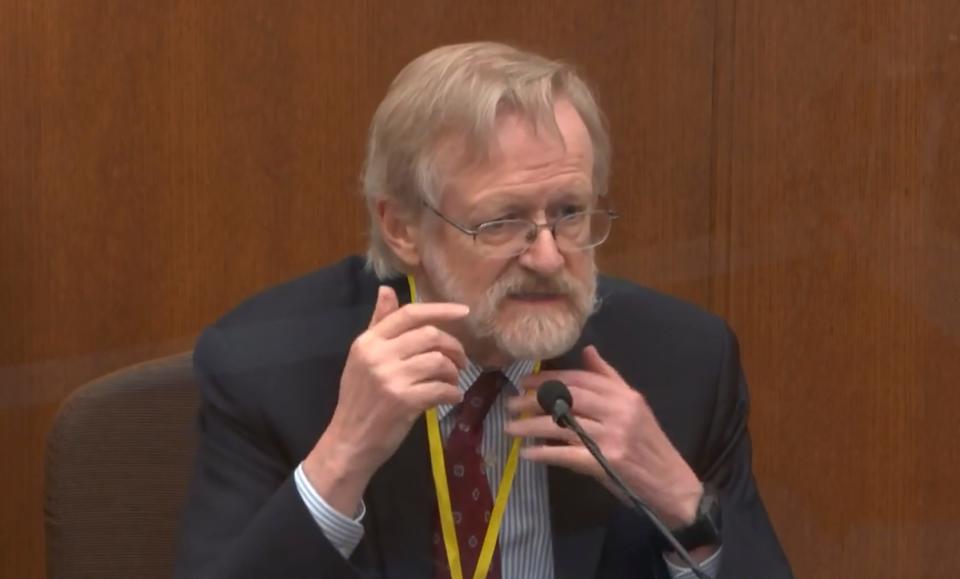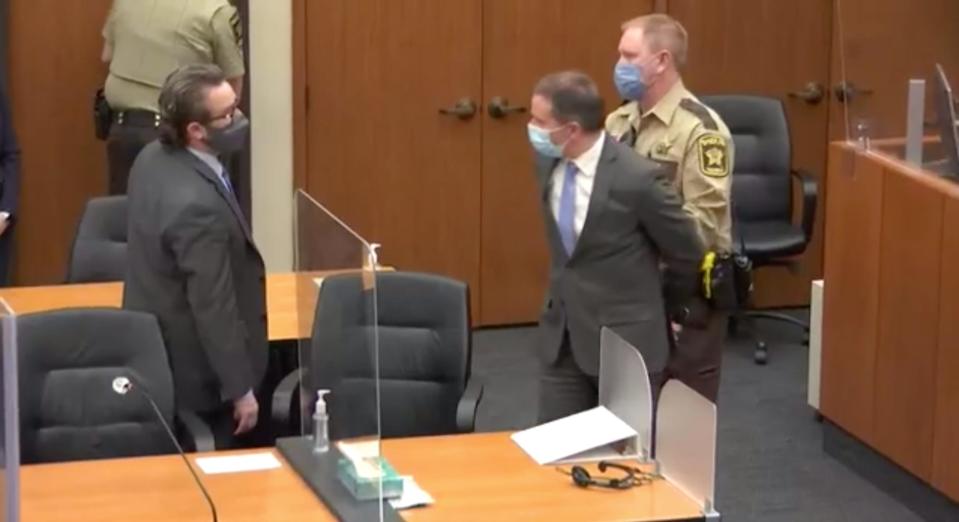First juror in Derek Chauvin trial to speak publicly says he didn't feel pressure to reach a guilty verdict
- Oops!Something went wrong.Please try again later.
One of 12 jurors who found former Minneapolis police officer Derek Chauvin guilty of George Floyd's murder is speaking out about his experience in the courtroom.
Brandon Mitchell, a 31-year-old Black man, is the first juror to speak publicly about the trial. The court has not released the names of the jurors, but is allowing them to speak publicly. Last week, an alternate juror who sat through witness testimony but did not deliberate said she believed Chauvin was guilty.
Speaking to "CBS This Morning" on Wednesday about whether the jurors felt pressure to reach a guilty verdict, Mitchell, formerly known as Juror 52, said: "Not at all. I don't think any of us felt like that.
"The pressure more so came from just being in the room and being under stress. But it wasn’t pressure to come to a guilty verdict."
Last week, the jury found Chauvin guilty of second- and third-degree murder and second-degree manslaughter in Floyd's killing outside a Cup Foods store last Memorial Day. Chauvin, who is white, was seen on cellphone video pinning Floyd, a 46-year-old Black man, to the ground with his knee for over nine minutes after police responded to a report that Floyd used a counterfeit $20 bill.
Hennepin County District Court Judge Peter Cahill revoked Chauvin's bail and told him to report back in eight weeks for sentencing. Chauvin faces 12 1/2 years, or 150 months, in prison under sentencing guidelines for a first-time offender. But the prosecution argues there are aggravating factors that require a longer prison term. That means Chauvin may face longer than that sentence.
Mitchell declined to give his view on an appropriate sentence for Chauvin.
"I think we came with the right verdict, and I'll let the judge do what he does," he said.
Mitchell said the prosecution's expert pulmonologist, Dr. Martin Tobin, was "the biggest, most influential witness of everybody." Tobin spoke directly to jurors for hours in a professorial tone, prompting them to gesture along with his testimony as he explained how people breathe. Mitchell also noted the "exhibits that he came with," referencing various charts and images Tobin presented to jurors.

"I just thought he broke it down in a manner that was easy for all the jurors to understand, and I didn't think there was any way for the defense to come back after that," Mitchell told CBS. "It was done at that point almost."
Mitchell also said the testimony of Donald Williams, a mixed martial arts fighter, "set the tone" for the trial. Williams took the stand on the first and second days of witness testimony. He is seen on videos yelling at Chauvin as the former officer pressed his knee into Floyd's neck.
Speaking separately on "Get Up! Mornings with Erica Campbell," Mitchell said the emotional testimony provided by Floyd's brother Philonise was the "toughest day" of the trial. That day, Floyd, 39, told jurors stories about growing up with his "big brother" as prosecutors played a slideshow of old family photos.
"I didn't want to be the one to break down in the courtroom," Mitchell said. "I just didn't want to be that person."
The trial was emotionally difficult for the jury, Mitchell told CBS. He said there were days when he didn’t know how he was "gonna make it in."
"Every day we had to come in and watch a Black man die," Mitchell told CBS. "As a human, it’s natural to feel some kind of way as you’re watching somebody in agony."

Just before closing arguments, Chauvin invoked his Fifth Amendment privilege to not testify. Mitchell said it "possibly could have made a difference" to the verdict if Chauvin had decided to take the stand.
"We did talk about the fact that he didn’t," Mitchell said.
Mitchell said the first thing jurors did when they entered deliberations was to vote on whether to take off their COVID-19 face masks, which they decided to do. Second, they voted on a foreperson. Third, on manslaughter charges.
"It happened really quickly," he told CBS. Eleven of the 12 jurors were ready to convict Chauvin on manslaughter off the bat, he said.
Speaking to Campbell, Mitchell said most of the jurors were ready to vote for convictions on the other charges relatively soon after deliberations began. Jurors deliberated for about 10 hours over two days.
"We sat in the room and argued for a few hours, pretty much with one person, trying to get them to see where they were coming from and trying to get them to know where everybody else was," Mitchell told Campbell. "We probably deliberated for a total of like four or five hours ... and I felt it should have been 20 minutes."
Describing the verdict, Mitchell said: "I think everybody was at peace with it. Everybody was on the same page, for sure. No question."

Mitchell told Campbell that he took a few days off from work after the trial concluded to decompress.
"I kind of feel like a weight has been lifted off my shoulders now," he told Campbell.
During jury selection last month, Mitchell told the court that he works in banking and enjoys his job because he has one-on-one contact with customers and helps them set and meet financial goals. He coaches youth sports, which he said often entails mediating disputes by parents over how much playing time their kids get.
He wrote in his juror questionnaire that he wanted to be picked for the jury because "from all the protests ... this is the most historic case of my lifetime and I’d like to be a part of it." And while he voiced strong opinions in his juror questionnaire, in court he said he could assess the trial evidence impartially.
He said he’s seen parts of the bystander video two or three times, but never in its entirety. That means Mitchell likely saw the full video for the first time during opening statements, when prosecutors played the entire thing on several screens in the courtroom.
He wrote in the questionnaire that he did not think Chauvin "set out to murder anyone." However, he wrote, "Why didn’t the other officers stop Chauvin? ... I don’t know if he was doing something wrong or not. But somebody did die."
Answering a question from a prosecutor during jury selection, Mitchell said he could explain a potential not-guilty verdict to the children he coaches without regrets.
This article originally appeared on USA TODAY: Chauvin trial verdict: Juror Brandon Mitchell didn't feel pressure

